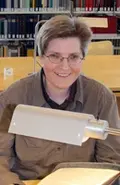The recovered manuscript Ms Eisenach 1361 of the Wartburg Foundation and its partial parallels: edition and situating in space and time
Duration
02/2021
- 01/2024
Funding
Deutsche Forschungsgemeinschaft (DFG) :
328 400 Euro
Project management

The Wartburg manuscript Ms Eisenach 1361-50 is a codex of 108 single-column double-sided leaves (216 pages), 115x85 mm in size, written in the XIV century and in a West Middle High German dialect. It was originally in the Premonstratensian monastery of Altenberg, before it first came into private ownership and then into the holdings of the Wartburg Foundation. The manuscript begins with thirteen psalms (2r-24v), all translated into Middle High German. This is followed by an anonymous sermon on the feast of the Assumption (25r-33r). From leaf 34r begins a series of 70 text pieces (34r-108v), some of them very short, the others longer. The last piece of text (n. 70) begins on fol. 108v and is not complete, since one leaf in the manuscript is torn out. From fol. 34r on, the manuscript has partial parallels with the Berlin manuscript, SBB-PK, Ms. germ. fol. 986, and there are still some similar fragments in a Munich manuscript, Munich Cgm. 5235 (4th v. XIV Cologne?, M60).
Some of the 70 text fragments begin with the indication of the author: Thomas Aquinas and Meister Eckhart are the two authorities mentioned by name as authors in this manuscript ("Meister Thomas sagt" or "Meister Eckhart sagt"), the others are anonymous ("Ein Meister sagt," "Einige Meister sagen," "Es gibt eine Frage"). Some of the texts assigned to Meister Eckhart were edited by the first editor of Meister Eckhart's German works, Franz Pfeiffer, as "sayings" in his Eckhart edition of 1857. Some of these sayings were then identified by Heinrich Denifle (about 30 years later) and Josef Koch (about 100 years later) as edited translations of Eckhart's Latin works translated into German, but the manuscript itself has been considered lost since 1909 and Eckhart's authorship of these pieces has been widely disputed. The other texts, which were known at least from the Berlin partial parallel manuscript, had not been addressed by researchers since then. However, a few years ago Balázs J. Nemes and Markus Vinzent discovered this manuscript in the library of the Wartburg Foundation. The project will produce a critical edition of this manuscript and make these texts available to researchers.
The previous sample analysis of the manuscript has shown that these texts cannot be understood directly on their own, but must be introduced into the context of the philosophical-theological debate of the time, and that only out of this context do their precise contents emerge. Such a contextualizing analysis also makes it possible to correct the information on authorship and to contribute to the study of the state of debate in the 14th century.
The language of the Wartburg manuscript, Middle High German, shows that the highly speculative theological themes were recorded in a vernacular, that is, in a non-university environment. Therefore, the close analysis of these texts will allow us to take a completely new look at lay education in the 14th century. Among other things, it concerns the education of women at that time, which, as the Wartburg manuscript suggests, cannot be reduced to "women's mysticism".
Further Information
Cooperation partner
Profile field
Religion, Society, and World Relations
